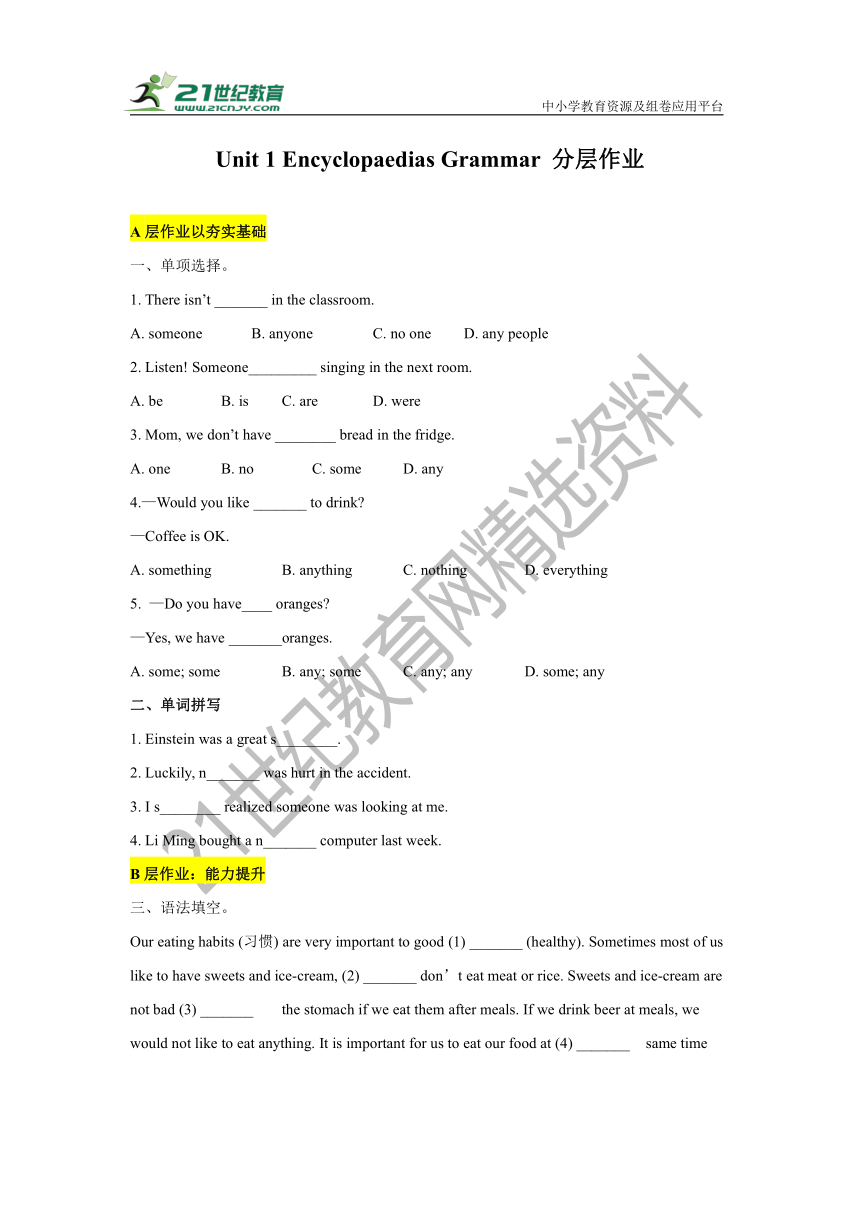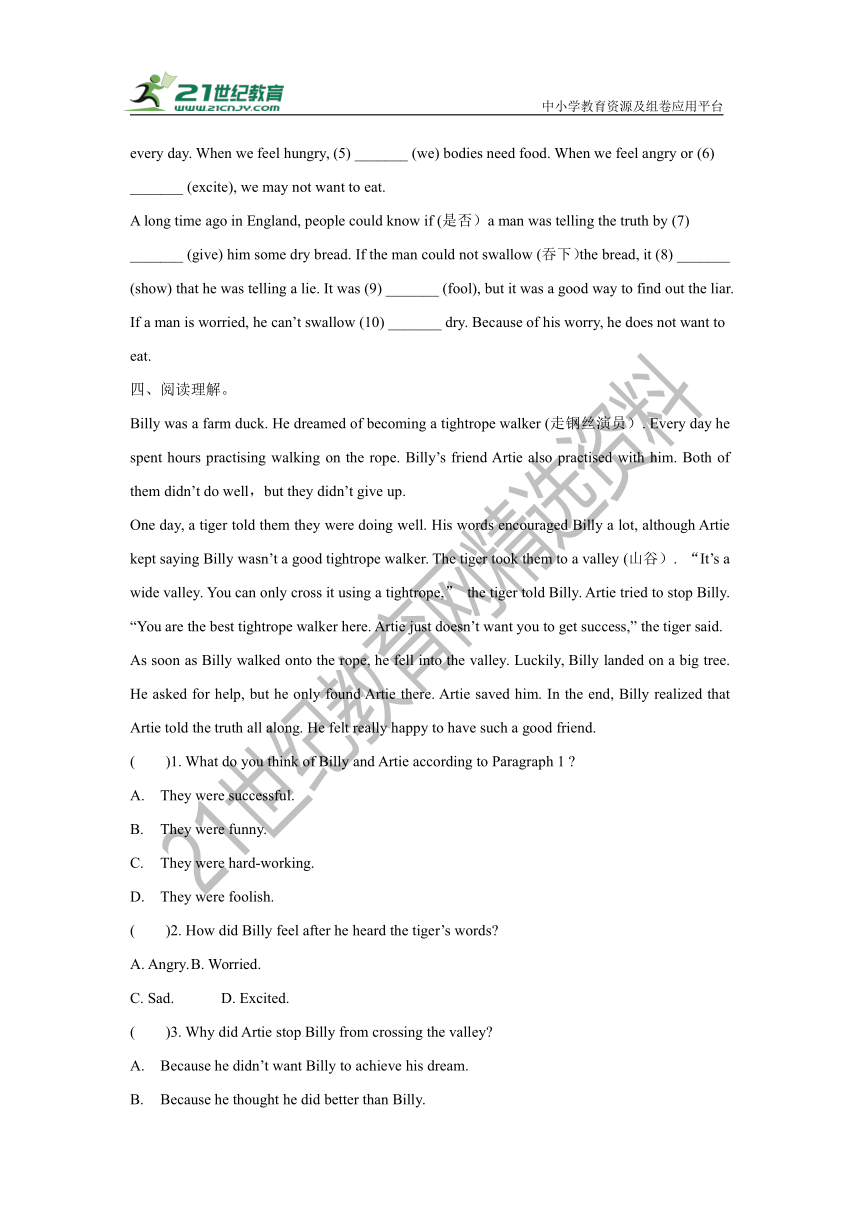【新课标】Unit 1 Encyclopaedias Period 3 Grammar 分层作业(含答案)
文档属性
| 名称 | 【新课标】Unit 1 Encyclopaedias Period 3 Grammar 分层作业(含答案) |  | |
| 格式 | doc | ||
| 文件大小 | 145.5KB | ||
| 资源类型 | 试卷 | ||
| 版本资源 | 牛津深圳版 | ||
| 科目 | 英语 | ||
| 更新时间 | 2022-08-12 09:02:38 | ||
图片预览


文档简介
中小学教育资源及组卷应用平台
Unit 1 Encyclopaedias Grammar 分层作业
A层作业以夯实基础
一、单项选择。
1. There isn’t _______ in the classroom.
A. someone B. anyone C. no one D. any people
2. Listen! Someone_________ singing in the next room.
A. be B. is C. are D. were
3. Mom, we don’t have ________ bread in the fridge.
A. one B. no C. some D. any
4.—Would you like _______ to drink
—Coffee is OK.
A. something B. anything C. nothing D. everything
5. —Do you have____ oranges
—Yes, we have _______oranges.
A. some; some B. any; some C. any; any D. some; any
二、单词拼写
1. Einstein was a great s________.
2. Luckily, n_______ was hurt in the accident.
3. I s________ realized someone was looking at me.
4. Li Ming bought a n_______ computer last week.
B层作业:能力提升
三、语法填空。
Our eating habits (习惯) are very important to good (1) _______ (healthy). Sometimes most of us like to have sweets and ice-cream, (2) _______ don’t eat meat or rice. Sweets and ice-cream are not bad (3) _______ the stomach if we eat them after meals. If we drink beer at meals, we would not like to eat anything. It is important for us to eat our food at (4) _______ same time every day. When we feel hungry, (5) _______ (we) bodies need food. When we feel angry or (6) _______ (excite), we may not want to eat.
A long time ago in England, people could know if (是否)a man was telling the truth by (7) _______ (give) him some dry bread. If the man could not swallow (吞下)the bread, it (8) _______ (show) that he was telling a lie. It was (9) _______ (fool), but it was a good way to find out the liar. If a man is worried, he can’t swallow (10) _______ dry. Because of his worry, he does not want to eat.
四、阅读理解。
Billy was a farm duck. He dreamed of becoming a tightrope walker (走钢丝演员). Every day he spent hours practising walking on the rope. Billy’s friend Artie also practised with him. Both of them didn’t do well,but they didn’t give up.
One day, a tiger told them they were doing well. His words encouraged Billy a lot, although Artie kept saying Billy wasn’t a good tightrope walker. The tiger took them to a valley (山谷). “It’s a wide valley. You can only cross it using a tightrope,” the tiger told Billy. Artie tried to stop Billy. “You are the best tightrope walker here. Artie just doesn’t want you to get success,” the tiger said.
As soon as Billy walked onto the rope, he fell into the valley. Luckily, Billy landed on a big tree. He asked for help, but he only found Artie there. Artie saved him. In the end, Billy realized that Artie told the truth all along. He felt really happy to have such a good friend.
( )1. What do you think of Billy and Artie according to Paragraph 1
A. They were successful.
B. They were funny.
C. They were hard-working.
D. They were foolish.
( )2. How did Billy feel after he heard the tiger’s words
A. Angry. B. Worried.
C. Sad. D. Excited.
( )3. Why did Artie stop Billy from crossing the valley
A. Because he didn’t want Billy to achieve his dream.
B. Because he thought he did better than Billy.
C. Because he didn’t like the tiger and wanted him to go away.
D. Because he thought it was dangerous for Billy to do it.
( )4. What does the underlined word “truth” mean
A. Fact. B. Dream.
C. Information. D. Danger.
( )5. What does the passage mainly want to tell us
A. We should always follow our friends’ advice.
B. It is hard to find true friends in life.
C. It’s useful to think about friends’ advice.
D. Don’t listen to people you don’t know.
C层作业:拓展训练
五、Can you summarize the usage of “some, any, something, anything, nothing, somebody, anybody, nobody.”
六、Write an email to your friend. Practise using “some, any, some-, any-” in your email.
参考答案
一、1. B 2. B 3. D 4. A 5. B
二、1.scientist 2. Nobody 3. Suddenly 4. new
三、1. health 2. but 3. for 4. the 5. our 6. excited
7. giving 8. showed 9. foolish 10. anything
四、1. C 2. D 3. D 4. A 5. C
五、some& any
We use some and any to talk about amounts.
We use some and any before plural countable nouns and uncountable nouns.
We usually use some/any in positive statements.
We usually use any in negative statements and questions.
Some is also used in questions to show request, suggestion and invitation.
We also use some in questions when we expect the answer to be “yes”.
some-&any-
We usually use some- in positive statements. We usually use any- in negative statements and questions.
somebody= someone
anybody= anyone
nobody=no one
We can form negative statements in two ways:
There is not anybody in the room.
There is nobody in the room.
We write no one as two words:
I saw nobody/no one/nothing in the office.
Somebody, anybody, nobody etc. are singular.
六、略
Unit 1 Encyclopaedias Grammar 分层作业
A层作业以夯实基础
一、单项选择。
1. There isn’t _______ in the classroom.
A. someone B. anyone C. no one D. any people
2. Listen! Someone_________ singing in the next room.
A. be B. is C. are D. were
3. Mom, we don’t have ________ bread in the fridge.
A. one B. no C. some D. any
4.—Would you like _______ to drink
—Coffee is OK.
A. something B. anything C. nothing D. everything
5. —Do you have____ oranges
—Yes, we have _______oranges.
A. some; some B. any; some C. any; any D. some; any
二、单词拼写
1. Einstein was a great s________.
2. Luckily, n_______ was hurt in the accident.
3. I s________ realized someone was looking at me.
4. Li Ming bought a n_______ computer last week.
B层作业:能力提升
三、语法填空。
Our eating habits (习惯) are very important to good (1) _______ (healthy). Sometimes most of us like to have sweets and ice-cream, (2) _______ don’t eat meat or rice. Sweets and ice-cream are not bad (3) _______ the stomach if we eat them after meals. If we drink beer at meals, we would not like to eat anything. It is important for us to eat our food at (4) _______ same time every day. When we feel hungry, (5) _______ (we) bodies need food. When we feel angry or (6) _______ (excite), we may not want to eat.
A long time ago in England, people could know if (是否)a man was telling the truth by (7) _______ (give) him some dry bread. If the man could not swallow (吞下)the bread, it (8) _______ (show) that he was telling a lie. It was (9) _______ (fool), but it was a good way to find out the liar. If a man is worried, he can’t swallow (10) _______ dry. Because of his worry, he does not want to eat.
四、阅读理解。
Billy was a farm duck. He dreamed of becoming a tightrope walker (走钢丝演员). Every day he spent hours practising walking on the rope. Billy’s friend Artie also practised with him. Both of them didn’t do well,but they didn’t give up.
One day, a tiger told them they were doing well. His words encouraged Billy a lot, although Artie kept saying Billy wasn’t a good tightrope walker. The tiger took them to a valley (山谷). “It’s a wide valley. You can only cross it using a tightrope,” the tiger told Billy. Artie tried to stop Billy. “You are the best tightrope walker here. Artie just doesn’t want you to get success,” the tiger said.
As soon as Billy walked onto the rope, he fell into the valley. Luckily, Billy landed on a big tree. He asked for help, but he only found Artie there. Artie saved him. In the end, Billy realized that Artie told the truth all along. He felt really happy to have such a good friend.
( )1. What do you think of Billy and Artie according to Paragraph 1
A. They were successful.
B. They were funny.
C. They were hard-working.
D. They were foolish.
( )2. How did Billy feel after he heard the tiger’s words
A. Angry. B. Worried.
C. Sad. D. Excited.
( )3. Why did Artie stop Billy from crossing the valley
A. Because he didn’t want Billy to achieve his dream.
B. Because he thought he did better than Billy.
C. Because he didn’t like the tiger and wanted him to go away.
D. Because he thought it was dangerous for Billy to do it.
( )4. What does the underlined word “truth” mean
A. Fact. B. Dream.
C. Information. D. Danger.
( )5. What does the passage mainly want to tell us
A. We should always follow our friends’ advice.
B. It is hard to find true friends in life.
C. It’s useful to think about friends’ advice.
D. Don’t listen to people you don’t know.
C层作业:拓展训练
五、Can you summarize the usage of “some, any, something, anything, nothing, somebody, anybody, nobody.”
六、Write an email to your friend. Practise using “some, any, some-, any-” in your email.
参考答案
一、1. B 2. B 3. D 4. A 5. B
二、1.scientist 2. Nobody 3. Suddenly 4. new
三、1. health 2. but 3. for 4. the 5. our 6. excited
7. giving 8. showed 9. foolish 10. anything
四、1. C 2. D 3. D 4. A 5. C
五、some& any
We use some and any to talk about amounts.
We use some and any before plural countable nouns and uncountable nouns.
We usually use some/any in positive statements.
We usually use any in negative statements and questions.
Some is also used in questions to show request, suggestion and invitation.
We also use some in questions when we expect the answer to be “yes”.
some-&any-
We usually use some- in positive statements. We usually use any- in negative statements and questions.
somebody= someone
anybody= anyone
nobody=no one
We can form negative statements in two ways:
There is not anybody in the room.
There is nobody in the room.
We write no one as two words:
I saw nobody/no one/nothing in the office.
Somebody, anybody, nobody etc. are singular.
六、略
